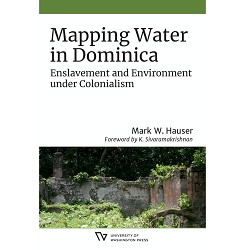
Please join us for a roundtable discussion on Mark Hauser's book Mapping Water in Dominica: Enslavement and Environment under Colonialism (University of Washington Press, May 2021).
An open access edition of the book is available — to download a (free) PDF, go to:
https://directory.doabooks.org/handle/20.500.12854/64528
Joining Professor Hauser in conversation will be Justin Dunnavant of Vanderbilt University and Professors Doris L. Garraway and Sherwin K. Bryant of Northwestern University. The conversation will be moderated by Jorge Coronado, Director of the Latin American and Caribbean Studies Program at Northwestern.
About the book
Dominica, a place once described as “Nature’s Island,” was rich in biodiversity and seemingly abundant water, but in the 18th century a brief, failed attempt by colonial administrators to replace cultivation of varied plant species with sugarcane caused widespread ecological and social disruption. Illustrating how deeply intertwined plantation slavery was with the environmental devastation it caused, Mapping Water in Dominica situates the social lives of eighteenth-century enslaved laborers in the natural history of two Dominican enclaves.
Mark Hauser draws on archaeological and archival history from Dominica to reconstruct the changing ways that enslaved people interacted with water and exposes crucial pieces of Dominica’s colonial history that have been omitted from official documents. The archaeological record—which preserves traces of slave households, waterways, boiling houses, mills, and vessels for storing water—reveals changes in political authority and in how social relations were mediated through the environment.
Plantation monoculture, which depended on both slavery and an abundant supply of water, worked through the environment to create predicaments around scarcity, mobility, and belonging whose resolution was a matter of life and death. In following the vestiges of these struggles, this investigation documents a valuable example of an environmental challenge centered around insufficient water.
About the speakers
Mark W. Hauser is Associate Professor of Anthropology and a faculty affiliate of the Latin American & Caribbean Studies Program at Northwestern University. He is an historical archaeologist who specializes in materiality, slavery and inequality. These key themes intersect in the 17th, 18th and 19th centuries Atlantic and Indian Oceans and form a foundation on his research on the African Diaspora and Colonial Contexts. He is the author of An Archaeology of Black Markets: Local Ceramics and Economies in Eighteenth-Century Jamaica (2008) and Mapping Water in Dominica: Enslavement and Environment under Colonialism (2021).
Justin Dunnavant is an Academic Pathways Postdoctoral Fellow at Vanderbilt University’s Spatial Analysis Research Laboratory. In fall 2021, he will join the faculty of UCLA’s Anthropology Department as an Assistant Professor. His current work in the US Virgin Islands investigates the relationship between ecology and enslavement in the former Danish West Indies. He has conducted archaeological research in US Virgin Islands, Belize, Jamaica, Ethiopia, Tanzania, Mozambique, and The Gambia. He is co-founder and President of the Society of Black Archaeologists and consults for the Smithsonian’s National Museum of African American History and Culture Slave Wrecks Project.
Doris L. Garraway is Associate Professor of French, Chair of the Department of French and Italian, and a faculty affiliate of the Latin American & Caribbean Studies Program at Northwestern University. Her research and teaching interests include Francophone Caribbean literature and historiography from the 17th to the 20th centuries, the Haitian Revolution, early modern French cultures, gender and slavery, postcolonial studies, law, and performance. She is the author of The Libertine Colony: Creolization in the Early French Caribbean (Duke University Press, 2005) and editor of Tree of Liberty: Cultural Legacies of the Haitian Revolution in the Atlantic World (University of Virginia Press, 2008).
Sherwin K. Bryant is Associate Professor of African American Studies and History, co-director of the Andean Cultures & Histories Working Group, and a faculty affiliate of the Latin American & Caribbean Studies Program at Northwestern University. As an historian of colonial Afro-Latin America and the Atlantic/Pacific Worlds, Bryant works at the intersections of cultural, legal, social history and political economy. His book Rivers of Gold, Lives of Bondage: Governing through Slavery in Colonial Quito (University of North Carolina Press, 2014) offers the first serious treatment in English of slavery and slave life in colonial Quito.
This is the final event in the Afro-Latin America: Representation, Politics, History series presented by the Latin American & Caribbean Studies Program, the Andean Cultures & Histories Working Group, and the Department of African American Studies at Northwestern in the Winter and Spring of 2021.
Register:
http://bit.ly/hauser-book-launch
Facebook event page:
https://www.facebook.com/events/1062918897863808/
Cost: Free
Audience
- Faculty/Staff
- Student
- Public
- Post Docs/Docs
- Graduate Students
Interest
- Academic (general)